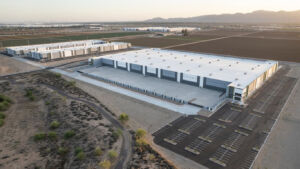Arizona is a hot spot. And it has nothing to do with our scorching summers.
The state’s job and economic growth forecasts over the next five years are among the best in the nation. Population growth through 2022 is expected to be the third-fastest in the country and employment growth is expected to be equally strong.
“Arizona continues to foster a welcoming pro-business environment for new and existing companies,” says Goodyear Mayor Georgia Lord. “We focus on areas that are important to businesses — such as reducing regulatory burdens, creating a competitive tax environment and growing a talented workforce, particularly in high-demand industries. The excellent connectivity to major markets along with a low-cost operating environment makes Arizona a competitive place to grow a business.”
And the business community has taken notice. In 2018, Greater Phoenix welcomed 42 businesses and three corporate headquarters, which represented $1.18 billion in capital investment and created 8,606 total jobs. Much of the credit for those jaw-dropping economic development numbers can be attributed to the Greater Phoenix Economic Council (GPEC).
“If you are a company looking to move into this market, GPEC provides analysis that will help you,” says Brad Vynalek, a partner at Quarles & Brady and a board member at GPEC. “GPEC will analyze your workforce needs, space needs, special needs and they have experts within the organization and analytics that are deeply tuned into what is happening and are able to identify the optimal synergy so that the path to this market is one that doesn’t have any friction and is one that is lasting.”
All about the data
Lord says the average person needs to understand that attracting a company to an area in 2019 is a data driven process.
“The more we, as leaders, can communicate the process to the public, the more they will understand the many variables considered by companies such as the importance of a quality workforce, readily available buildings and shovel-ready sites, and market connectivity,” Lord says.
Because of those changing demands, Vynalek says GPEC has evolved from being an organization that was focused on business attraction to becoming an organization that produces data and analytics that show where the market is going, where we want the market to be going, and what we can do to keep the market going in the direction we want it to go.
“That is all built around real data” Vynalek says, “not just the visceral, ‘We want more of these kinds of companies here.’ GPEC has used analytics to create core areas where we think we can compete and then rigorously focusing on that, rather than just focusing on bringing in any business we can bring in.”
Because GPEC’s data has improved that ease to market, an increasing number of companies are moving to Metro Phoenix or setting up office here to help them grow. Experts say Metro Phoenix is fast-paced and possesses an unapologetic willingness to get things done, making it one of the top cities to do business. The region has a pioneering spirit and welcoming attitude – toward people and business — and that spirit is becoming contagious in the business world.
“Arizona is one of the fastest growing places to cultivate a company for multiple reasons,” says Brett Johnson, a partner at Snell & Wilmer who represents businesses and individuals in government relations matters.
Here are the top three qualities that are attracting businesses to Metro Phoenix, according to Johnson:
• Arizona prides itself on hard work, innovation, and entrepreneurship. Although still a competitive environment, there is a collective desire for everyone to succeed.
• The friendly regulatory environment and cooperative government agencies make it easy to grow a business.
• Due to Arizona’s higher education capabilities and quality of life, companies are able to attract top talent to Arizona.
Unifying force
Tying those elements together and marketing them to the world has been GPEC, which works with its 22 member communities, Maricopa County and more than 150 private investors to attract quality businesses and is credited with helping turn Metro Phoenix into one of the best tech relocation cities.
“GPEC concentrates on strategic efforts to promote the region by leveraging public and private sector partnerships, which proves to be a core strength of the organization,” Lord says. “GPEC understands developing trends in the business community and remains a resource for our rising companies. Their business connections and knowledge of trends often present opportunities and outlets for emerging companies to share technology and applications to advance their operations.”
Experts say GPEC has been able to effectively market the region thanks to a favorable tax structure and legislative ease, especially compared with markets like California, where there is a lot of regulation, taxes are higher and there are more challenges to doing business.
“Arizona offers a pipeline of opportunities,” Vynalek says. “I’ve observed over the past two decades that the connectivity between Seattle and Phoenix, Silicon Valley and Phoenix and even New York and Phoenix offer pipeline opportunities. People are now seeing Phoenix as a destination for an opportunity and not just as a low-cost provider. What we don’t want to be is just a place where it’s cheap to live. Leaders in other markets are now seeing that Arizona is a great place to do business and there is real innovation happening there. That hasn’t always been the case.”
Vynalek says Phoenix’s narrative has been changed in large part through the leadership of Chris Camacho, GPEC’s president and CEO.
“He is an amazing ambassador for the city,” Vynalek says. “After business leaders from other markets meet with Chris Camacho, they walk away thinking Phoenix is the center of technology, Phoenix is the center of growth, Phoenix is the center of opportunity and Phoenix is the center of optimism. GPEC’s ability to be an effective ambassador for Metro Phoenix is phenomenal.”
Ready to work
One criticism Arizona has historically faced has been in regards to education. What business leaders say GPEC has done very effectively is to change that narrative by stressing Arizona’s strengths. Experts say Greater Phoenix has built a skilled, diverse workforce that is prepared for in-demand disciplines in emerging industries. Graduates from the state’s forward-thinking universities and community colleges are being prepared to excel in the jobs of today and jobs that don’t even exist yet.
“This market rises when we create high-quality jobs, more educational opportunities and a skilled workforce,” Vynalek says. “That’s what is happening here and that raises the tide for everybody.”
The skilled workforce piece of that equation and how it fits into Arizona’s success in attracting and growing new businesses cannot be overstated, experts say.
“If you look at the amazing research that comes out of the University of Arizona, Arizona State University and Northern Arizona University and the kind of talent that is being produced, that narrative is extraordinary,” Vynalek says. “It’s a mind-blowing change.”
According to GPEC:
• From nationally-ranked schools to globally renowned universities, Greater Phoenix offers a wide array of educational opportunities.
• The region has an extremely competitive workforce while maintaining one of the lowest costs for labor in the nation.
• Maricopa Community Colleges is the largest community college system in the U.S., educating and training more than 200,000 individuals annually.
• More than 40 universities and other institutions prepare the market’s workforce across a variety of industries.
• With a median age of 35.4, the region’s population is one of the youngest in the nation.
“There is more talent here today than there has ever been,” Vynalek says. “Business leaders from others markets are seeing how companies like GoDaddy and the education technology companies that were founded have turned Greater Phoenix into an innovative growth market and they are asking themselves, ‘Why aren’t we a part of that?’”
Recent economic development wins
• Airobotics, a leading Israeli automated drone startup, launched its North American headquarters in Scottsdale, Arizona, where they will run all North America, South America and Central America operations. Airobotics plans to grow the Scottsdale team to 80 employees by the end of 2019.
• Andersen Corporation, a window and door manufacturer, plans to build a new manufacturing and distribution campus in Goodyear. Andersen plans to invest more than $105 million and create more than 415 jobs during the first phase of this expansion.
• Bull Moose Pipe Company announced plans to grow its Casa Grande manufacturing operation with a $5.3 million capital investment and plans to create 16 new jobs.
• Cambridge Senior Living will construct a new facility, creating 88 new jobs with a capital investment of $20 million.
• Cives Steel, one of the largest structural steel and plate fabricators in North America, is expanding its presence in El Mirage and creating 50 new jobs with a capital investment of $19 million.
• Creighton University is constructing a new, nearly $100 million health sciences campus at Park Central in midtown Phoenix, which will eventually house nearly 800 Creighton health sciences students in Arizona.
• Deloitte announced an expansion of its Arizona footprint with a new U.S. delivery center for technology solutions in Gilbert. The initial $34 million investment will result in the occupancy of 102,000-square-feet of space at The Commons at Rivulon. The project is expected to generate 2,500 jobs over multiple phases.
• EdgeCore Internet Real Estate invested more than $150 million in its Mesa Data Center Campus, which broke ground in March and will help EdgeCore offer cloud-connected data center solutions to the world’s most demanding customers. EdgeCore’s Mesa Data Center Campus is part of the City’s Elliot Road Technology Corridor.
• Gorbel, a leading manufacturer of overhead material handling cranes and fall protection products, expanded into Greater Phoenix with the addition of a manufacturing facility in Goodyear, which will add more than 20 projected jobs during the first phase in addition to a sizable capital investment.
• King Koil opened a new 90,000-square-foot factory in Avondale. The company plans initially to employ 50 people at the site, which will service retail partners in Arizona, Alaska, California, Colorado, Hawaii, Idaho, Montana, Nevada, Oregon, Utah, Washington and Wyoming.
• Nationwide Insurance announced it will establish a regional headquarters in Scottsdale, creating more than 500 new jobs and investing $139 million.
• Nikola Motor Company’s hydrogen-electric semi-truck manufacturing headquarters facility will bring more than $1 billion in capital investment and 2,500 jobs to the region by 2024.
• Oscar, one of the country’s fastest growing health insurance startups offering consumer-focused, technology-driven healthcare, announced that it will expand its presence in Tempe, leasing an additional 46,000 square feet of space at The Circuit. This new contract will enable Oscar’s creation of 400 new jobs in Tempe by 2020.
• Prenexus Health announced Gilbert as the location for its prebiotic ingredient manufacturing and corporate headquarters. The facility will occupy 39,000-square-feet at AZ|60 in Gilbert’s Northwest Corridor and will create 45-50 new jobs created over the next two years.
• SeaCa Packaging announced its expansion to Greater Phoenix with the groundbreaking of a manufacturing plant in Surprise, creating 65 phase one jobs and bringing a $17 million capital investment.
• Scheidt & Bachmann USA, Inc. picked Phoenix as the site for its Western Region Innovation & Testing Center of Excellence, which will create an estimated 20 new high-tech jobs.
• Sendoso announced that it is expanding its company’s presence with a new office in Scottsdale. Sendoso creates the technology that leading companies use to personalize moments at scale using direct mail.
• Voya Financial, Inc. announced it will open a new office in the metro Phoenix area, creating more than 1,000 jobs and making a capital investment of $60 million.



